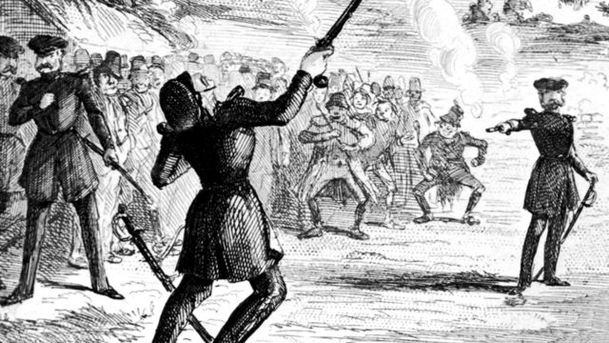Pistols at Dawn

Between 1613 and 1614 it is claimed that every distinguished family in the UK lost a member to duelling. James I even campaigned against it, but the aristocracy wanted to retain it as a legal way of settling disputes 'honourably'. The practice continued until it was eventually outlawed at the end of the nineteenth century. Until it was, the duel has a fascinating place in British history as a means of 'solving' dispute and novelists and playwrights have been using it as a way of spicing up plots and intrigue along the way. As a youngster, Justin Champion loved adventure novels which were jam-packed with sword play - The Three Musketeers, The Prisoner of Zenda and Scott's Waverley series. He has always been intrigued as to why men felt the urgency to defend their honour in such a dangerous way. In this programme, he tracks the history of the duel, its influence, some particularly pivotal duels, is shown how to sword fight and thinks he's found the reason why duelling eventually ceased as a practice in the UK. Justin talks to experts of Shakespeare to discuss how frequently the Bard picked up on the duelling debate in many of his plays including Romeo and Juliet. He visits the Royal Armouries Collection in Leeds to witness a sword fight. Justin is shown the techniques and is handed a sword for a tutorial. He charts the move from sword to pistol and gets a tour behind the scenes at the Royal Armouries Collection to look at some important swords and pistols involved in duelling. Justin also talks to fellow historians about significant duels and their political and literary impact. The duel has even been used by Cabinet Ministers and Prime Ministers as a way of settling their differences. We hear from the BBC Deputy Political Editor, James Landale (who tells the story of his ancestor's involvement in the last fatal duel in Scotland in 1826) and who also tells listeners about Wellington's engagement in a duel in Battersea. Listeners will also hear from a social historian of the 19th century about how the meaning of "honour" changed for men during this period and how a pension arrangement changed forever as the willingness of men to accept an invitation to "pistols at dawn". In the programme are short extracts from newspapers and plays to illustrate the points Justin and his interviewees will be making. Presenter: Professor Justin Champion is head of history at Royal Holloway, University of London. Producer: Sarah Taylor.